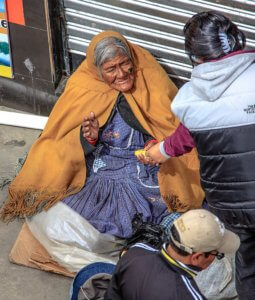“The poverty is jarring, painful, unjust, overwhelming and very nearly hope-depleting.”
This is SAM missionary Laurie Bremer’s reflection on poverty after living in Santa Cruz, Bolivia, with her family for their first 2 years of ministry.
“It causes me to feel guilt, shame, compassion, empathy, and so many other emotions all at once,” she continues, “every time I am reminded that I am in the car and they are on the streets. Just like the last time we drove through this intersection.»
 According to Bolivia’s National Institute of Statistics, the portion of Bolivia’s population living in poverty has dropped 20% in the past 15 years, but it still rests near 40%. This reality is the context for many of SAM’s missionaries who have to wrestle daily with how to engage with this poverty as compassionate Christ followers.
According to Bolivia’s National Institute of Statistics, the portion of Bolivia’s population living in poverty has dropped 20% in the past 15 years, but it still rests near 40%. This reality is the context for many of SAM’s missionaries who have to wrestle daily with how to engage with this poverty as compassionate Christ followers.
“There are some things I imagine one never gets used to,” Laurie states. “Abject poverty is one of those things.”
“Is this just a fool’s errand?” she asks. “From every earthly perspective, it is. This mess is far too big. I want to throw my hands up in despair. I want to run away to where poverty isn’t so confrontational. What an ugly truth to realize in one’s self: I prefer poverty in avoidable pockets that don’t encroach into everyday suburban life.”
While Laurie may be particularly outspoken or self-aware in this realization, she certainly is not alone. According to the US Census Bureau’s 2016 estimates, the United State’s poverty rate hovers around 12.7%, or 43.1 million people. Despite this fact, though there was a rise in charitable donations last year, only 25% of the US adult population volunteered their time to a charitable organization.
It’s simply more comfortable to click “donate”.
Eradicating poverty, ending homelessness or solving world hunger requires action and effort. Even if our calling is to a specific career or ministry that feels disconnected from these issues, we must still avoid isolating ourselves from the “least of these”.
“We know many hardworking, long-suffering missionaries who are involved in street ministry. They work with addicts. They work with children living on the streets… I know that I am not called to this ministry,” Laurie declares. “But that does not negate the question, ‘What am I doing here that makes a difference in the life of the impoverished people in Bolivia?’ Because it is not okay for my answer to be ‘nothing’. I can’t just say ‘Well, that’s not my ministry’… I truly believe that the ministry in which we are engaged will bear fruit and [that] some day it will rain blessings upon the least of these.”
Because it is not okay for my answer to be ‘nothing’.
 Laurie and her husband serve in professional class ministry, interacting daily with pilots, lawyers, doctors, dentists, academic and civic leaders in Santa Cruz. Though her ministry focuses mostly on the middle and upper classes, she sees the direct connection to the impoverished communities around her: “As overwhelming as the depth of poverty reaches here, what if there was revival at all levels in Bolivia? What if professionals with the ability to make a change were awakened to how God has called us all to care for the least of these?”
Laurie and her husband serve in professional class ministry, interacting daily with pilots, lawyers, doctors, dentists, academic and civic leaders in Santa Cruz. Though her ministry focuses mostly on the middle and upper classes, she sees the direct connection to the impoverished communities around her: “As overwhelming as the depth of poverty reaches here, what if there was revival at all levels in Bolivia? What if professionals with the ability to make a change were awakened to how God has called us all to care for the least of these?”
It’s not an excuse to avoid the homeless. She will see them every day. They will ask for money at her car door and she will continually feel the overwhelming burden of the impoverished in her city.
But Laurie does not despair: “Without Christ, it would feel overwhelming and hopeless. It would BE overwhelming and hopeless. But we know that He cares greatly for those who have so many desperate needs, just as He cares for those who have so much affluence that they feel no need for Him at all.»
The call to love our neighbor extends beyond all socioeconomic boundaries. We do not have the right to limit the command to love your neighbor as yourself based on personal preference or comfort.
“Do we know that we will live to see the eradication of such terrible poverty in Bolivia?” Laurie asks. “No, we do not. But I know this for certain: Because of the faith and the hope that we have, fools or not, we will go down fighting on this errand, if that’s what we’ve been called to do.”
